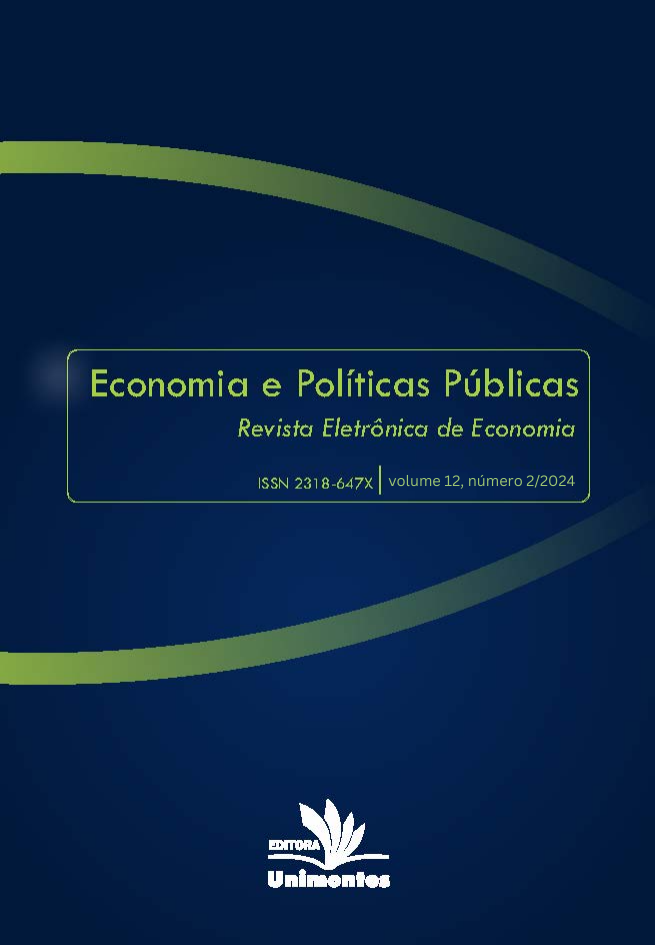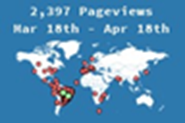Electronic government as a tool to promote open government.
DOI:
10.46551/epp2024v12n0211Keywords:
Public administration; Open Government; Electronic Governance; Electronic Government; ICT.Abstract
Open Government seeks to promote transparency, collaboration, innovation, social control and participation as a way of democratically managing the public sector and combating corruption. To enable these objectives, Information and Communication Technologies (ICTs) are implemented by the State, making up the Electronic Government (e-gov). Based on these assumptions, this research seeks to highlight the relationship between Open Government and Electronic Government, and how this relationship is established for the benefit of civil society. It was possible to determine a relationship between end activity and means activity, revealing a strategic nature between the two concepts and its implications for the fluidity in the use of ICTs by public administration. This research aimed to contribute to a more objective and visual approach to the relationship between Electronic Government and open Government.
Downloads
References
ALEXANDRINI, Fábio; PISKE, Ingobert; PISKE, Ricardo. Prefeitura virtual: a Internet a serviço da comunidade. Revista Gestão & Regionalidade, v. 22, n. 65, p. 64-74, Setembro-Dezembro, 2006. Disponível em: <http://www.spell.org.br/documentos/ver/21577/prefeituravirtual--a-internet-a-servico-da- comunidade> Acesso em: 20 de Set. 2019.
ARAUJO, M. H.; REINHARD, N.; CUNHA, M. A. Serviços de Governo Eletrônico no Brasil: Uma Análise a Partir das Medidas de Acesso e Competências de Uso da Internet. Revista de Administração Pública, v. 52, n. 4, p. 676-694, Julho-Agosto, 2018. Disponível em: <http://www.scielo.br/scielo.php?script=sci_abstract&pid=S0034- 76122018000400676&lng=pt&nrm=iso> Acesso em: 25 Set. 2019.
CHADWICK, A. Bringing e-democracy back in: why it matters for future research on e-governance.Thousand Oaks, Estados Unidos: 2003.
MEDEIROS, Paulo Henrique Ramos; GUIMARÃES, Tomás de Aquino. A institucionalização do governo eletrônico no brasil. Revista de Administração de Empresas, v. 46, n. 4, p. 66-78, Outubro-Dezembro, 2006. Disponível em:< http://www.scielo.br/scielo.php?script=sci_arttext&pid=S0034-75902006000400007 > Acesso em: 24 set. 2019.
BRAGA, Lamartine Vieira; ALVES, Welington Souza; FIGUEIREDO, Rejane Maria da Costa; SANTOS, Rildo Ribeiro dos. O papel do Governo Eletrônico no fortalecimento da governança do setor público. Revista do Serviço Público, v. 59, n. 1, p. 5-21, Janeiro- Março, 2008. Disponível em: <http://www.spell.org.br/documentos/ver/35770/o-papel-do- governoeletronico-no-fortalecimento-da-governanca-do-setor-publico>. Acesso em: 24 set. 2019.
BRASIL. DECRETO DE 15 DE SETEMBRO DE 2011. Institui o Plano de Ação do Governo Aberto e dá outras providências. Disponível em: <http://www.planalto.gov.br/ccivil_03/_ato2011-2014/2011/dsn/dsn13117.htm>. Acesso em: 16 abr 2021.
BRASIL. DECRETO DE 09 DE DEZEMBRO DE 2019. Institui o Plano Nacional do Governo Aberto e o Comitê Interministerial de Governo Aberto. Disponível em: <http://www.planalto.gov.br/CCIVIL_03/_Ato2019-2022/2019/Decreto/D10160.htm>. Acesso em: 16 abr 2021.
CUNHA, Maria Alexandra Viegas Cortes; MIRANDA, Paulo Roberto de Mello. O Uso de TICS pelos Governos: uma proposta de agenda de pesquisa a partir da produção acadêmica e da prática nacional. Revista Organização e Sociedade (O&S), v. 20, n. 66, p. 543-566, julho-setembro 2013. Disponível em: <http://www.scielo.br/pdf/osoc/v20n66/10.pdf> Acesso em: 27 set. 2019.
PRZEYBILOVICZ, Erico; CUNHA, Maria Alexandra; MEIRELLES, Fernando de Souza. O uso da tecnologia da informação e comunicação para caracterizar os municípios: quem são e o que precisam para desenvolver ações de governo eletrônico e smart city. Revista de Administração Pública (RAP), v. 52, n. 4, p 630-649, agosto, 2018. <http://www.scielo.br/pdf/rap/v52n4/1982-3134-rap-52- 04-630.pdf> Acesso em: 27 set. 2019.
DINIZ, Eduardo Henrique; BARBOSA, Alexandre Fernandes; JUNQUEIRA, Alvaro Ribeiro Botelho; PRADO, Otavio. O governo eletrônico no Brasil: perspectiva histórica a partir de um modelo estruturado de análise. Revista de Administração Pública (RAP), v. 43, n.1, p. 23-48, janeiro-fevereiro, 2008. Disponível em: <http://www.scielo.br/pdf/rap/v43n1/a03v43n1.pdf> Acesso em: 27 set. 2019.
MACEDO, S. V.; VALADARES, J. L. Disponibilização dos Dados Governamentais Abertos pelos Poderes Executivos Estaduais Brasileiros. Revista Economia & Gestão, v. 20, n. 57, p. 25-43, 2020.
SANCHEZ, Cristiane S.; MARCHIORI, Patrícia Z. Participação Popular no Contexto das Iniciativas de Governo Aberto: revisão sistemática de literatura. Revista Brasileira de Políticas Públicas e Internacionais, v. 2, n. 2, p. 103-118. Dezembro, 2017. Disponível em: <http://www.spell.org.br/documentos/ver/50060/participacaopopular-no-contexto-das- iniciativas-de-governo-aberto--revisao-sistematica-da literatura> Acesso em: 25 Set. 2019
FREITAS, Rony Klay Viana; DARCOSO, Antonio Luiz Rocha. Inovação aberta na gestão pública: análise do plano ação brasileiro para a Open Government Partnership. Revista Administração Pública (RAP), v. 48, n. 4, p. 869-888. Julho-Agosto, 2014. Disponível em: <http://bibliotecadigital.fgv.br/ojs/index.php/rap/article/view/30880/29700> Acesso em: 23 Set. 2019.
OPEN GOVERNMENT PARTNERSHIP (OGP). Relatório Anual de Parceria de Governo Aberto de 2020. Disponível em: <https://www.opengovpartnership.org/ogp- 2020-annual-report/>. Acesso em: 16 jul 2021.
REIS, Audálio Fernandes dos; DACORSO, Antonio Luiz Rocha; TENORIO, Fernando Antonio Guimarães. Influência do uso de tecnologias de informação e comunicação na prestação de contas públicas municipais - um estudo de caso no Tribunal de Contas dos Municípios do estado da Bahia. Rev. Adm. Pública, Rio de Janeiro, v. 49, n. 1, p. 231- 251, Fev. 2015. Disponível em: <http://www.scielo.br/scielo.php?script=sci_arttext&pid=S0034- 76122015000100231&lng=en&nrm=iso>. Acesso em: 27 Set. 2019.
SEM AUTOR: GOVERNO ABERTO. Governo Federal, Brasil. 2019 Disponível em: <https://governoaberto.cgu.gov.br/> Acesso em: 25 Set. 2019.
Downloads
Published
How to Cite
Issue
Section
License
Copyright (c) 1970 Journal of Economics and Public Policies

This work is licensed under a Creative Commons Attribution-NonCommercial-NoDerivatives 4.0 International License.
Os trabalhos publicados não serão remunerados em hipótese alguma.
O (s) autor (es), ao submeterem o trabalho à análise, automaticamente cedem os direitos de publicação à Revista, em sua versão eletrônica. e/ou impressa (A revista também será impressa e depositada em algumas bibliotecas de referência) licenciado sob a Licença Creative Commons Attribution (CC BY-NC-ND 4.0).
Os autores dos trabalhos aprovados NÃO terão direito a qualquer exemplar da edição em que constar sua publicação, pois trata-se de versão eletrônica.
Serão aceitos trabalhos com, no máximo, três autores.
Todos os casos não previstos serão analisados e decididos pelo Conselho Editorial que, dentre outras atribuições, ficará encarregada de informar aos autores da possibilidade da publicação, contra os quais não caberá recurso.




















